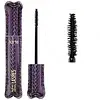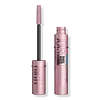Tarte Lights, Camera, Lashes 4-In-1 Mascara Versus Maybelline Lash Sensational Sky High Waterproof Mascara
What's inside
What's inside
 Key Ingredients
Key Ingredients

 Benefits
Benefits

 Concerns
Concerns

 Ingredients Side-by-side
Ingredients Side-by-side

Water
Skin ConditioningOryza Sativa Bran Wax
Skin ConditioningCyclopentasiloxane
EmollientHydrogenated Olive Oil Stearyl Esters
Emulsion StabilisingCopernicia Cerifera Cera
EmollientAlcohol Denat.
AntimicrobialPalmitic Acid
EmollientStearic Acid
CleansingCandelilla Cera
EmollientTriethanolamine
BufferingAcacia Senegal Gum
MaskingPanthenol
Skin ConditioningVp/Va Copolymer
Polyvinyl Alcohol
Aminomethyl Propanediol
BufferingChlorphenesin
AntimicrobialAscorbyl Palmitate
AntioxidantPhenoxyethanol
PreservativeCI 77499
Cosmetic ColorantWater, Oryza Sativa Bran Wax, Cyclopentasiloxane, Hydrogenated Olive Oil Stearyl Esters, Copernicia Cerifera Cera, Alcohol Denat., Palmitic Acid, Stearic Acid, Candelilla Cera, Triethanolamine, Acacia Senegal Gum, Panthenol, Vp/Va Copolymer, Polyvinyl Alcohol, Aminomethyl Propanediol, Chlorphenesin, Ascorbyl Palmitate, Phenoxyethanol, CI 77499
Isododecane
EmollientCera Alba
EmollientCopernicia Cerifera Cera
EmollientDisteardimonium Hectorite
StabilisingWater
Skin ConditioningAlcohol Denat.
AntimicrobialAllyl Stearate/Va Copolymer
Oryza Sativa Cera
Skin ConditioningParaffin
PerfumingPolyvinyl Laurate
Vp/Eicosene Copolymer
Propylene Carbonate
SolventTalc
AbrasiveSynthetic Beeswax
Emulsion StabilisingEthylenediamine/Stearyl Dimer Dilinoleate Copolymer
Skin ConditioningPEG-30 Glyceryl Stearate
EmulsifyingRayon
Hydrogenated Jojoba Oil
AbrasiveCaprylic/Capric Triglyceride
MaskingSilica
AbrasivePentaerythrityl Tetra-Di-T-Butyl Hydroxyhydrocinnamate
AntioxidantBambusa Vulgaris Extract
Skin ConditioningBHT
AntioxidantCI 77491
Cosmetic ColorantCI 77492
Cosmetic ColorantCI 77499
Cosmetic ColorantCI 77007
Cosmetic ColorantMica
Cosmetic ColorantCI 77891
Cosmetic ColorantCI 75470
Cosmetic ColorantCI 77288
Cosmetic ColorantCI 77742
Cosmetic ColorantCI 77510
Cosmetic ColorantIsododecane, Cera Alba, Copernicia Cerifera Cera, Disteardimonium Hectorite, Water, Alcohol Denat., Allyl Stearate/Va Copolymer, Oryza Sativa Cera, Paraffin, Polyvinyl Laurate, Vp/Eicosene Copolymer, Propylene Carbonate, Talc, Synthetic Beeswax, Ethylenediamine/Stearyl Dimer Dilinoleate Copolymer, PEG-30 Glyceryl Stearate, Rayon, Hydrogenated Jojoba Oil, Caprylic/Capric Triglyceride, Silica, Pentaerythrityl Tetra-Di-T-Butyl Hydroxyhydrocinnamate, Bambusa Vulgaris Extract, BHT, CI 77491, CI 77492, CI 77499, CI 77007, Mica, CI 77891, CI 75470, CI 77288, CI 77742, CI 77510
 Reviews
Reviews

Ingredients Explained
These ingredients are found in both products.
Ingredients higher up in an ingredient list are typically present in a larger amount.
Alcohol Denat. is an alcohol with a denaturant property. It is created by mixing ethanol with other additives.
This ingredient gets a bad rep because it is irritating and drying - mostly due to its astringent property. Astringents draw out natural oils in tissue, constricting pores and leaving your skin dried out.
However, alcohol denat. is not all that bad.
Due to its low molecular weight, alcohol denat. tends to evaporate quickly. One study on pig skin found half of applied alcohol evaporated in 10 seconds and less than 3% stayed on skin.
This also helps other ingredients become better absorbed upon application.
Studies are conflicted about whether this ingredient causes skin dehydration. One study from 2005 found adding emollients to propanol-based sanitizer decreased skin dryness and irritation. Another study found irritation only occurs if your skin is already damaged.
Small amounts of alcohol are generally tolerated by oily skin or people who live in humid environments.
The rule of thumb is if this alcohol is near the end of an ingredients list, it will probably not affect your skin much.
Also...
This ingredient has antimicrobial and solvent properties.
The antimicrobial property helps preserve products and increase their shelf life. As a solvent, it helps dissolve other ingredients.
Other types of astringent alcohols include:
Learn more about Alcohol Denat.Ci 77499 is also hydrated iron III oxide. It is created from mixing red and black iron oxides. This helps give shades of darkness to a product.
Iron III oxides are classified as inorganic chemicals for coloring.
This ingredient comes from a palm tree native to Brazil. This ingredient is used to thicken texture and leaves behind a film when applied.
Water. It's the most common cosmetic ingredient of all. You'll usually see it at the top of ingredient lists, meaning that it makes up the largest part of the product.
So why is it so popular? Water most often acts as a solvent - this means that it helps dissolve other ingredients into the formulation.
You'll also recognize water as that liquid we all need to stay alive. If you see this, drink a glass of water. Stay hydrated!
Learn more about Water